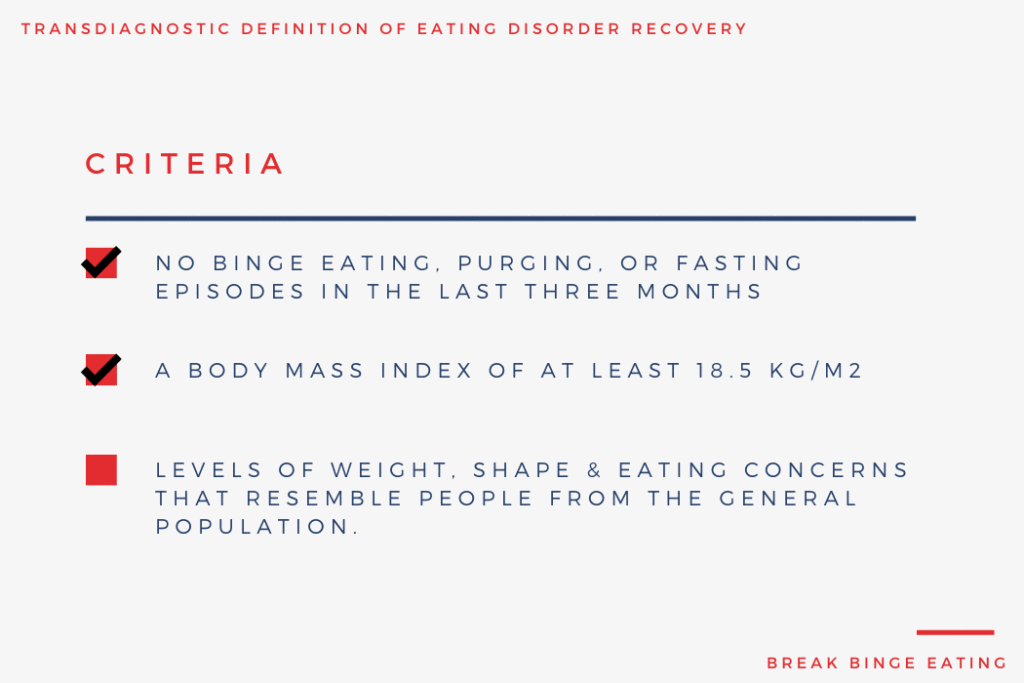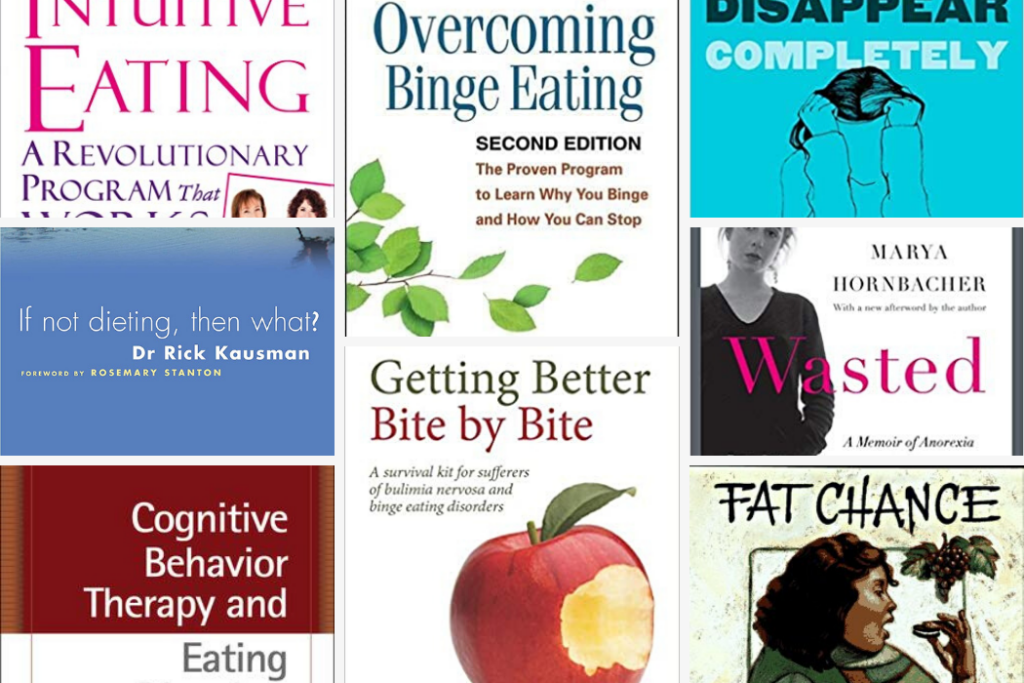If you – or a loved one – are dealing with an eating disorder, then I’m sure you’re aware of its devastating effects.
Eating disorders run a chronic course, and they are notoriously difficult to treat.
And because of this, it’s understandable that you might be wondering whether recovery is even possible.
Let me assure you one thing.
Recovery is definitely possible!
Many people have fully recovered from their eating disorder.
In fact, spontaneous recovery (i.e., recovery without treatment) is even possible.
Let me show you what spontaneous recovery rates look like across each of the main eating disorders after 5 or so years. These figures are based on large, well-conducted naturalistic research studies 1Fairburn, C. G., Cooper, Z., Doll, H. A., Norman, P., & O’Connor, M. (2000). The natural course of bulimia nervosa and binge eating disorder in young women. Archives of general psychiatry, 57(7), 659-665.
- For bulimia nervosa, after 5 years 41% are expected to recover naturally
- For binge-eating disorder, after 5 years 35% are expected to recovery naturally
- For anorexia nervosa, nearly 45% are expected to recovery naturally.
While these numbers aren’t perfect, it does show that recovery is certainly possible and that it is important not to give up on the quest for recovery.
I’ll discuss later in this article what recovery rates look like in people who receive treatment, but for now I first want to touch on the definition of recovery and what it actually means.
In this article, I want to focus closely on the topic of recovery, and how you can achieve it.
Table of Contents
Defining Recovery
One of the major problems we have in the field is coming up with an accepted definition of recovery.
This is changing, however, as more and more people are beginning to use similar recovery definitions.
This wasn’t previously the case, with recovery definitions varying from person to person, from practitioner to practitioner, and from researcher to researcher.
Let’s take a look at some of the earlier definitions of recovery.
- Bulimia nervosa recovery was often defined as the complete cessation of binge eating and purging behaviour.
- Binge-eating disorder recovery was often defined as the complete cessation of binge eating.
- Anorexia nervosa recovery was often defined as achieving a body weight above the threshold required for the diagnosis.
These definitions of recovery have one thing in common.
And that is that they are either focused on physical (e.g., a person’s weight) or behavioural (e.g., binge eating and purging) characteristics of the disorder.
There’s one problem with that.
Eating disorders are cognitive in nature.
Many of the core features of eating disorders are cognitive constructs that are not captured in these definitions.
Consider extreme body image concerns, a preoccupation with food, and dietary restraint… just to name a few.
In fact, research shows that people are very likely to relapse if some of these cognitive features aren’t adequately addressed during treatment 2Fairburn, C. G., Peveler, R., Jones, R., Hope, R., & Doll, H. (1993). Predictors of 12-month outcome in bulimia nervosa and the influence of attitudes to shape and weight. Journal of Consulting and Clinical Psychology, 61, 696-698.
Therefore, we need a definition of recovery that takes into account all relevant features of eating disorders, including the behavioural, physical, and cognitive features.
The transdiagnostic recovery definition is one such definition.
The Transdiagnostic Definition of Eating Disorder Recovery
The transdiagnostic definition of recovery applies to every eating disorder.
This definition is broken down into three criteria, and the person must meet each of the criteria in order to be considered “recovered”.

- No binge eating, purging, or fasting episodes in the last three months
- A body mass index of at least 18.5 kg/m2
- Levels of weight concerns, shape concerns, eating concerns, and dietary restraint that resemble people from the general population.
As you’ll see, this definition covers it all – the physical, behavioural, and cognitive features.
But, is there any merit to this definition?
There is.
Previous research has shown that people with a prior eating disorder who met each of these three criteria were indistinguishable from healthy controls 3Bardone-Cone, A. M., Harney, M. B., Maldonado, C. R., Lawson, M. A., Robinson, D. P., Smith, R., & Tosh, A. (2010). Defining recovery from an eating disorder: Conceptualization, validation, and examination of psychosocial functioning and psychiatric comorbidity. Behaviour Research and Therapy, 48, 194-202.
Also, let’s take a look at what rates of recovery are – based on this transdiagnostic definition – after people receive specialist eating disorder treatment.
- Between 40-60% of people with anorexia nervosa achieve recovery after CBT treatment
- Around 60% of people with bulimia nervosa and binge-eating achieve recovery after CBT while only 35% do after interpersonal therapy.
So, given that this definition of recovery is applicable to all eating disorders, should we all apply this definition of recovery?
Perhaps.
But, I feel like there is something missing.
Quality of Life? The Missing Piece
Many people who seek help for an eating disorder want to improve their quality of life.
This is because eating disorders can cause profound deficits in social, emotional, physical, and psychological functioning.
Addressing the symptoms doesn’t necessarily mean that your quality of life or life satisfaction will improve.
The transdiagnostic definition doesn’t take into account quality of life, and I think this is an important drawback.
I’d argue that you can’t be considered recovered if your quality of life, or social and emotional health, is still poor.
So, in order for sustained recovery over a long period, you need to work on your general physical, emotional, and social health as well.
Eating Disorder Recovery Tips
Arguably the most common question that gets asked is how can one recover from an eating disorder.
Whilst there’s no simple answer to this, I will do my best to provide some eating disorder recovery tips.
The first tip I can offer is that you must be motivated to change.
If you’re not motivated, then there’s a very good chance that you won’t recover.
That said, it’s understandable that you might be ambivalent towards change. After all, you are probably so close to your eating disorder now that it might be too daunting to let it go.
This is the eating disorder mindset – it tricks you into not wanting to change.
You need to override these thoughts and muster up the motivation to change.
A good model to assess where your current motivation is at is through the 5 Stages of Change Model.
Stages of Change Model
Take a look at each of the five stages and have a think about which stage resonates with you.
- Pre-Contemplation Stage – where you don’t believe your eating disorder is a problem. You might be in denial, refuse to talk about the issue, and be adamant that you don’t need to change.
- Contemplation Stage – where you start to recognise that you’ve got a problem but are ambivalent towards changing.
- Preparation Stage – where you’ve made a decision to change and have started to make some plans to do so (e.g., booked in with a therapist).
- Action Stage – where you’re actively trying to change your behaviour and recover from your eating disorder.
- Maintenance Stage – where you’ve recovered for a prolonged period of time.
If you’re serious about recovery, then you want to be in the preparation or action stage.
If you’ve found yourself in the earlier stages, then it might be a good idea to list all the pros and cons of “keeping” your eating disorder.
This list is called a Decision Balance Matrix.
Having a list like this in front of you, and noticing that the pros of changing will undoubtedly far outweigh the cons, is one useful way for moving up the stages.
Why should you bother first with trying to work on your level of motivation?
Well, there’s good evidence showing that motivation levels predict better treatment outcomes. In other words, people who have higher levels of motivation are the ones most likely to recovery – or have the best chance of recovering – than people who don’t have high motivation levels 4Vall, E., & Wade, T. D. (2015). Predictors of treatment outcome in individuals with eating disorders: A systematic review and meta‐analysis. International Journal of Eating Disorders, 48(7), 946-971.
Give it a go!
Once you’re motivated, there are a bunch of other things you could implement to increase the chances of recovery.
I will stress that this list needs to be practiced together in order for the best outcomes!
It’s difficult for them to work in isolation.
Seek Help
I know – an obvious tip.
However, you’ll be surprised how few people actually seek help.
The sooner you seek and receive help, the greater the chances of achieving recovery. In fact, early intervention is one of the better predictors of long-term recovery, while people who find themselves leaving “too late” will find themselves struggling to achieve recovery. This is because the eating disorder becomes so entrenched in ones identify.
I understand that receiving help isn’t feasible for some people, due to financial, geographical, and personal constraints.
This doesn’t mean you can’t buy a self-help book or look on the web for some evidence-based strategies!
These self-help programs can be enormously useful and can assist with the recovery process.
Or, alternatively, call a free helpline service.
Seek social support
Seeking support from your loved ones plays a huge role in the recovery process.
Don’t fight the battle yourself.
Allow your family and friends to be involved and help you throughout this important process.
They will be important for sustaining motivation, providing encouragement, and keeping you accountable towards your quest for change!
We know that poor social support a major cause of various eating disorder behaviours. People who find themselves experiencing interpersonal conflict often resort to binge eating and purging as a means to escape these encounters.
Finding support that will help build your self-esteem will minimize the importance placed on weight and shape, reduce the likelihood of eating disorder behaviours, and ultimately enable you to recover quicker.
Do your Research
Learn about eating disorders.
It sounds counter-intuitive, I know, but the more you can understand the illness the better you’ll be able to address it head-on.
Not only would it be a good idea to learn about eating disorders, including what’s keeping them going, what’s causing them, and what effective techniques might be, but also seek out and read recovery-oriented books.

Learn about others’ experiences of recovery.
You might find some novel techniques that’s worked for others to work for you, too.
You can never stop learning.
Eat at Regular Intervals
Almost all eating disorders are characterised by extreme levels of dietary restraint.
Dietary restraint is a major trigger for binge eating and purging and can be the primary mechanism by which someone can maintain a dangerously low body weight.
You need address dietary restraint. And one to do this is to eat regularly.
By this, I mean eating at least 3 meals and snacks per day, no more than 3-4 hours apart.
Maintaining a consistent pattern of regular eating will curb the hunger cravings, provide you with sustained energy, and prevent the onset of eating disorder behaviours.
In fact, the “regular eating” strategy is arguably the most powerful strategy in CBT for eating disorders. In isolation, it’s even been shown to help people recover, simply by following a set of guidelines around how and when to eat.
Immerse Yourself in a New Hobby
The problem with eating disorders is that it takes up all of your attention – you’re constantly thinking about your weight, shape, and eating patterns.
That can be exhausting.
You need to de-emphasise the importance placed on eating, weight and shape.
And to do this, I’d encourage you to really dive into a new hobby – one that has nothing to do with body image or food.
Consider things like taking up a new course, learning to code, playing an instrument, or learning to paint.
If you invest enough time into multiple different hobbies, you’ll begin to notice that your focus will shift, and the importance you place on your weight and shape will subside.
This is crucial, because the overvaluation of weight and shape is the key driver of eating disorders, and research shows that if you haven’t sufficiently addressed these faulty beliefs, then you’re very likely to relapse down the track.
You need to work really hard towards minimizing the importance placed on weight and shape, and one way to do this is to enrich other areas of your life.
Adopt Healthy Coping Strategies
Most eating disorder behaviours are also caused by our inability to tolerate negative moods.
We binge when we feel lonely.
We restrict when we feel threatened.
We need new and healthier ways to respond to these negative mood states.
Consider investing time into learning how to implement the following healthy emotion regulation strategies:
- Mindfulness meditation
- Yoga
- Acceptance
- Problem solving
These strategies could go a long way towards stopping your eating disorder behaviours.
In fact, most of the strategies are incorporated into our standard treatments, and each in isolation have been shown to have a positive effect on various eating disorder symptoms.
While they may not lead to recovery in isolation, practicing them among all the other strategies listed above will increase the likelihood of you ditching the eating disorder for good.
So is Recovery Possible?
Recovering from an eating disorder is difficult.
There’s no doubt about that.
But it doesn’t mean it’s impossible – so many people all around have been able to recover from their eating disorder.
Implementing some of the techniques above may increase the likelihood of recovery.
But, ultimately, you’ll need to provide your absolute best efforts!
References

It’s great to learn that you should seek support from loved ones to help recover from an eating disorder. My brother is wanting to become healthier and he was wondering how he can help get over his eating disorder. I’ll be sure to tell him that he should try talking to our family to help him get through his eating disorder.
Hi Steve,
Absolutely. Peer and family support is one of the more important protective factors. It can go a long way towards recovery.
Regards,
Jake
Thank you for this article. It’s very insightful. I am 33 and I have had a binge eating disorder for 20 years. I’ve sought help on numerous occasions, however, I was in a very unstable and unsupportive environment during those times which I believe was to the detriment of any possible positive outcome.
My eating disorder and preoccupation with food, both binge eating and restricting has pervaded my every thought, every emotion and every action for the past 20 years to the point where the first thing I did when I woke up from a surgery was plan my next binge session and how I would acquire the food I needed without anyone noticing. How do you fight that? How do you battle against something that feels so instinctive?
Some days I believe I’m doing well as I haven’t binged for quite a while until I realise I have simply just slipped back into the restrictive phase without paying attention and a binge cycle is imminent. I find it almost impossible to eat a normal balanced diet without the unrelenting urge to either control completely or lose control completely.
I feel as though this disordered pattern of eating is an innate part of me now as I’ve suffered it for so long. I can’t even imagine what it would be like to wake up tomorrow and participate in life without thinking about my weight every 5 seconds or battling the urge to binge/starve myself, but I would give anything to have that.
Thank you so much for the great article. My biggest concern is: what if peer and family especially are not able to give me support? They don’t seem to understand how an eating disorder “works” and make me feel judged in stead of supported. Do you have any good tips for this kind of situation? Thank you